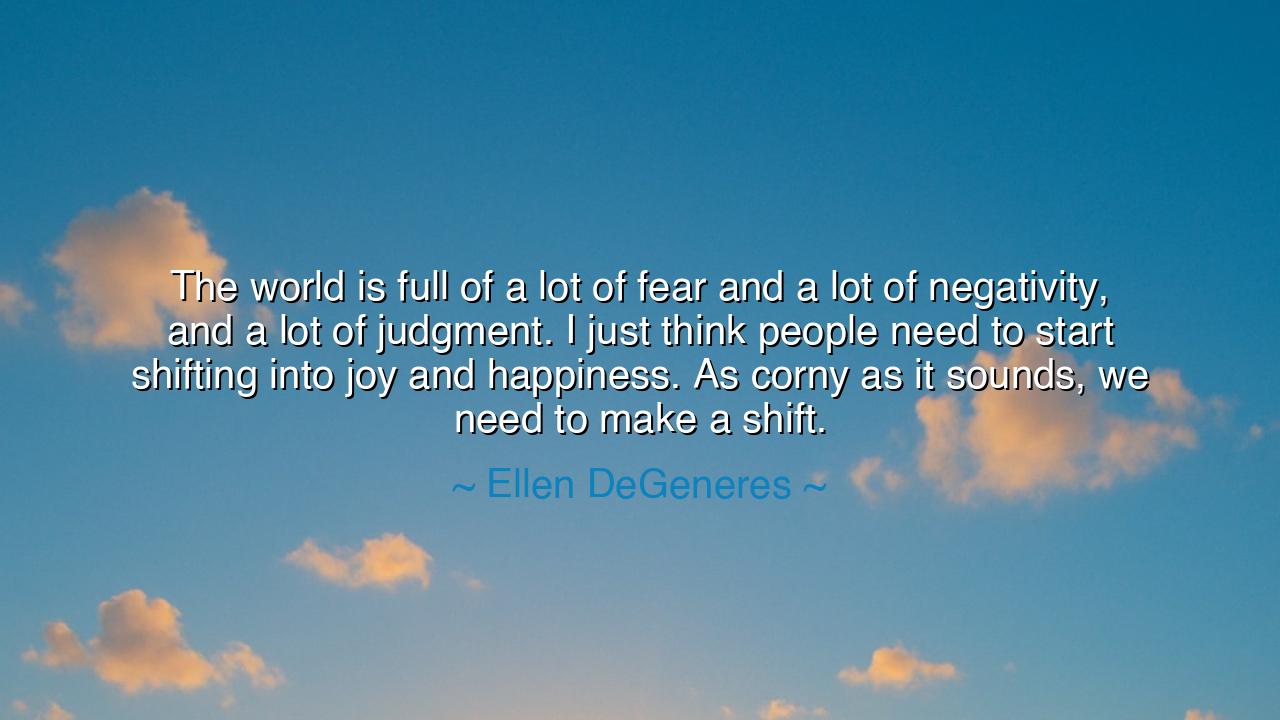
The world is full of a lot of fear and a lot of negativity, and a
The world is full of a lot of fear and a lot of negativity, and a lot of judgment. I just think people need to start shifting into joy and happiness. As corny as it sounds, we need to make a shift.






In the words of Ellen DeGeneres, “The world is full of a lot of fear and a lot of negativity, and a lot of judgment. I just think people need to start shifting into joy and happiness. As corny as it sounds, we need to make a shift,” lies a timeless truth that echoes through the corridors of human history. This is not merely a modern sentiment spoken by an entertainer; it is a call as old as humanity itself — a summons to light in an age of shadow. For every generation stands at a crossroads between despair and hope, between the judgment of others and the understanding of self. Ellen’s words, though simple, reach into the ancient soil of the spirit, urging mankind to choose joy as both rebellion and redemption.
Once, in the ancient city of Athens, the philosopher Socrates stood trial for corrupting the youth and disrespecting the gods. The crowd was filled with judgment, their hearts trembling with fear of ideas that challenged their certainty. Yet, even as the sentence of death was passed upon him, Socrates drank the poison calmly, speaking not of bitterness but of peace — for he believed that no harm could touch the soul that remained true to its inner light. Like Ellen’s call, his act was a shift — from fear to acceptance, from noise to wisdom, from the world’s judgment to the freedom of joy.
Fear and negativity have always walked beside mankind, whispering doubts, planting seeds of hatred, blinding the heart with shadows. In ancient times, it was the fear of the unknown gods; in modern times, it is the fear of rejection, failure, and difference. Yet the heart of humanity has always yearned to rise above this mire. When Ellen speaks of shifting into joy, she does not dismiss the darkness — she commands that we move through it, with courage. To shift is not to ignore reality, but to transform one’s response to it. It is the alchemy of the soul, the turning of sorrow into laughter, and wounds into wisdom.
Consider the story of Nelson Mandela, who spent twenty-seven years in prison, confined by walls that sought to crush his spirit. He could have emerged bitter, filled with vengeance against his captors. Instead, he walked free with a smile and forgiveness in his heart, declaring that “as I walked out the door toward the gate that would lead to my freedom, I knew if I didn’t leave my bitterness and hatred behind, I’d still be in prison.” Mandela made the shift Ellen speaks of — a shift from fear to freedom, from judgment to compassion, from negativity to hope. In doing so, he healed not only himself but a nation divided by pain.
The ancients knew that the mind is a mirror that shapes the world it beholds. If we gaze into it with anger, the reflection grows sharp and cruel. But if we behold it with love and joy, the reflection becomes radiant, warm, and forgiving. Ellen’s plea is a continuation of this ancient teaching: that to transform the world, one must first transform the heart. When she says “as corny as it sounds,” she speaks with humility, knowing that truth often appears simple — yet it is the simple truths that demand the greatest strength to live by.
To live in joy is not to deny suffering but to rise above it. It is the heroic act of refusing to let the darkness define us. The warrior who smiles in battle, the mother who sings amid poverty, the friend who forgives betrayal — these are the saints of the everyday world. Their laughter is rebellion. Their kindness, a victory. Their happiness, a torch that defies the night.
Let this, then, be the lesson carried forward: that every heart holds within it the power to shift — from despair to gratitude, from fear to faith, from judgment to compassion. Begin not with great acts, but with small ones: a kind word when anger tempts you, a moment of stillness when chaos surrounds you, a breath of laughter when tears threaten to fall. In each such moment, you push the world a little closer to light.
So remember this teaching, O listener of ages: The world does not change when the storms cease; it changes when we learn to dance in the rain. In making the shift from fear to joy, from judgment to love, we become not merely survivors of this world — but its healers, its poets, and its builders of dawn.






AAdministratorAdministrator
Welcome, honored guests. Please leave a comment, we will respond soon